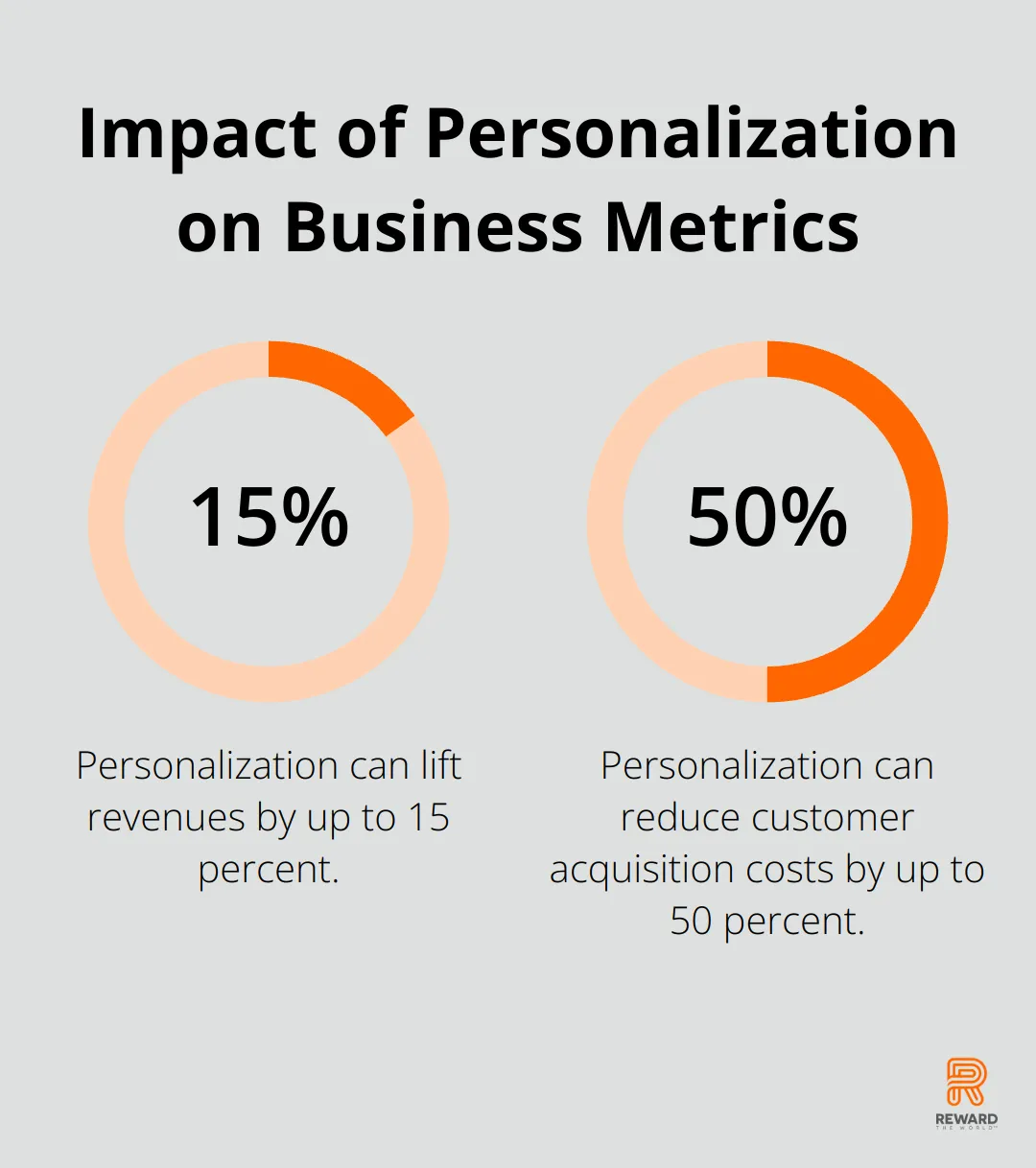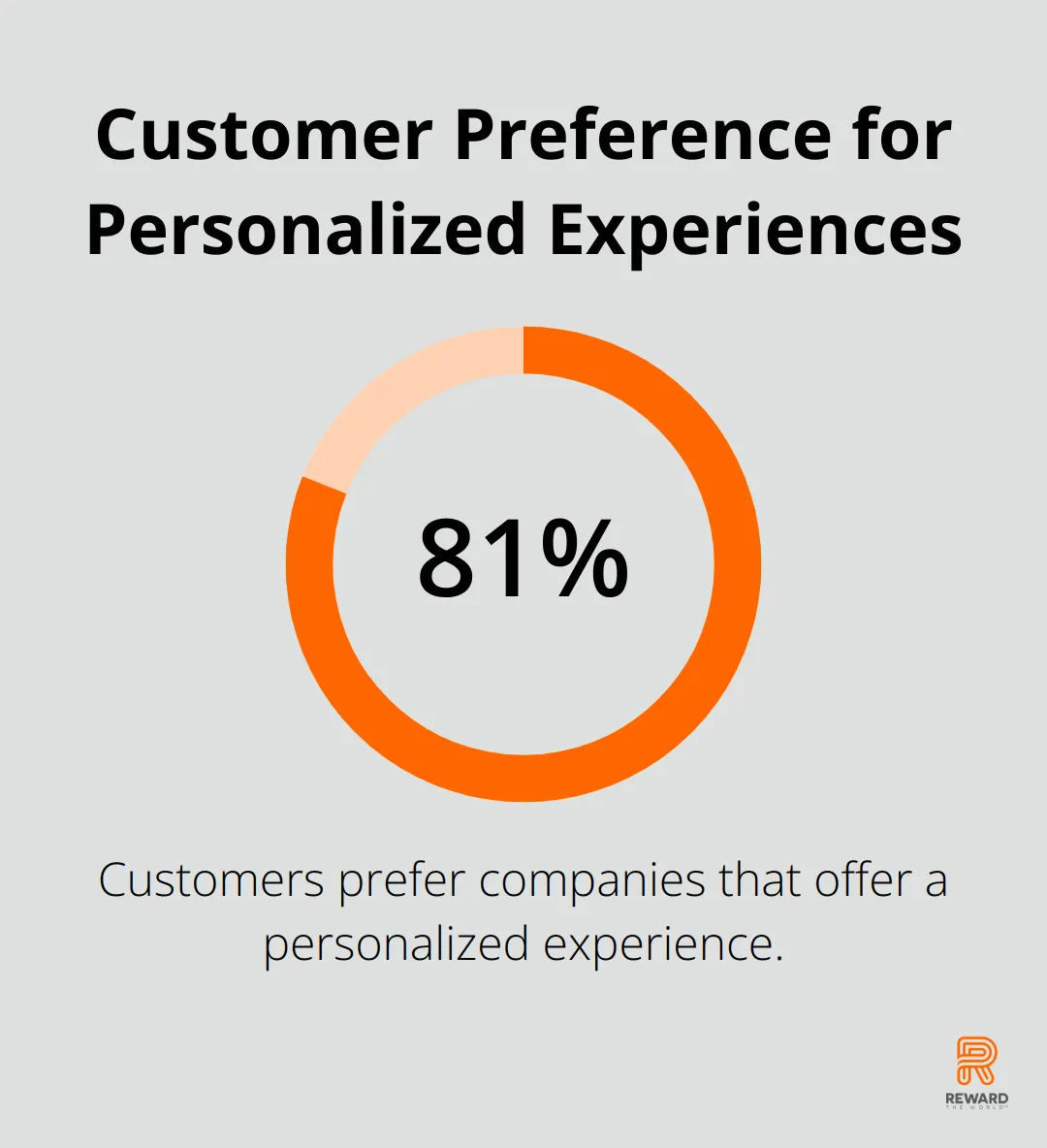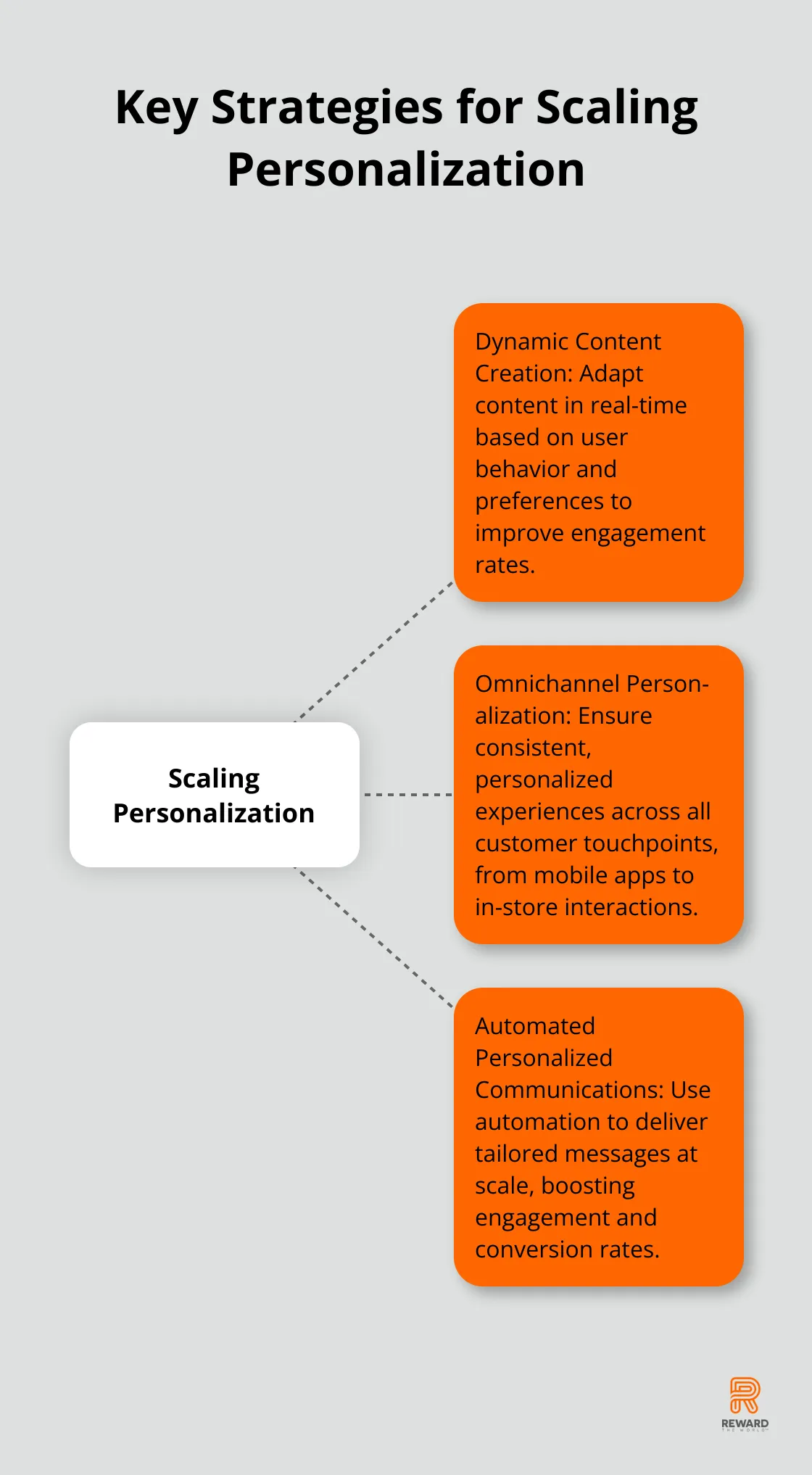
At Reward the World, we’ve seen firsthand how personalization at scale can transform customer experiences.
In today’s digital landscape, delivering tailored interactions to millions of customers is no longer a luxury-it’s a necessity.
This blog post will explore the strategies and technologies that enable businesses to provide 1-1 experiences on a massive scale, boosting satisfaction, loyalty, and revenue.
Why Personalization Matters
The Power of Tailored Experiences
Personalization isn’t just a buzzword-it’s a game-changer in customer experience. Tailored interactions can dramatically boost business outcomes. Let’s explore why personalization packs such a punch and how it can transform your customer relationships.
Customer Satisfaction Soars
Personalization directly impacts customer satisfaction. McKinsey reports that 71 percent of consumers expected companies to deliver personalized interactions. When businesses meet this expectation, they see remarkable results.
Revenue Growth Accelerates
Personalization doesn’t just make customers happy-it boosts your bottom line. McKinsey found that personalization marketing can lift revenues by 5 to 15 percent and reduce customer acquisition costs by as much as 50 percent. This translates to real dollars: a shift to top-quartile performance in personalization could unlock significant value across industries.

Market Differentiation Sharpens
In today’s competitive landscape, personalization serves as a key differentiator. Accenture discovered that AI and personalization are transforming consumer experiences, boosting engagement, satisfaction, and loyalty in the digital age. This preference for personalized experiences can significantly impact brand perception and loyalty.
Technology Enables Scale
Implementing personalization at scale presents challenges, but the rewards are substantial. Advanced technology allows businesses to deliver personalized experiences to millions of customers simultaneously. Data-driven insights and AI-powered solutions create meaningful, one-to-one interactions that drive satisfaction, boost revenue, and set companies apart from the competition.
As we move forward, we’ll explore the specific strategies and tools that make large-scale personalization possible. The next section will focus on how businesses can harness data and technology to create these tailored experiences for their entire customer base.
Harnessing Data for Personalized Experiences
The Power of Customer Data Collection
Effective personalization starts with comprehensive customer data collection. Companies need to gather information from various touchpoints, including website interactions, purchase history, social media engagement, and customer service interactions. Customer data collection drives personalization at scale and can inform better decision-making and deliver greater results.
To collect this data effectively, businesses should:
- Implement robust Customer Relationship Management (CRM) systems
- Use website analytics tools to track user behavior
- Leverage social listening tools to understand customer sentiment
- Conduct regular surveys and feedback sessions
AI and Machine Learning: The Personalization Powerhouses
AI and Machine Learning transform the personalization landscape. These technologies process vast amounts of data to identify patterns and predict customer preferences with remarkable accuracy.
By analyzing data from a customer’s purchase history, preferences, and feedback, AI enables businesses to offer highly personalized interactions, from product recommendations to targeted marketing campaigns.
To implement AI and ML effectively:
- Invest in AI-powered recommendation engines
- Use chatbots for personalized customer service
- Implement predictive analytics for targeted marketing campaigns
- Leverage natural language processing for sentiment analysis
Segmentation and Predictive Analytics
Customer segmentation and predictive analytics allow businesses to group customers based on shared characteristics and predict future behavior. This enables more targeted and effective personalization strategies.
A recent study found that 81% of customers prefer companies that offer a personalized experience, and 70% say a personalized experience in which the employee knows who they are is important. Advanced segmentation and predictive analytics help businesses meet these expectations more effectively.

Key strategies include:
- Develop detailed customer personas
- Use RFM (Recency, Frequency, Monetary) analysis for customer segmentation
- Implement predictive lead scoring
- Utilize cohort analysis to understand customer behavior over time
Data-Driven Approaches in Action
Many companies have integrated these data-driven approaches into their platforms, enabling businesses to deliver personalized rewards and incentives at scale. Reward the World (our top choice in this field) stands out with its ability to provide instant reward delivery spanning eGift cards, cash payments, and points in over 60 million rewards across various categories.
The power of data, AI, and advanced analytics allows companies to create truly personalized experiences that resonate with millions of customers. This approach drives satisfaction, loyalty, and ultimately, business growth. As we move forward, we’ll explore how to scale these personalization efforts to reach even larger audiences effectively.
Scaling Personalization Strategies That Work

Dynamic Content Creation
Dynamic content adapts in real-time based on user behavior, preferences, and data. This approach allows businesses to serve relevant content to each visitor, which improves engagement rates. To implement dynamic content effectively:
- Use A/B testing to optimize content variations
- Implement real-time content recommendations based on browsing history
- Personalize product descriptions and imagery to match user preferences
Amazon’s product recommendation engine exemplifies dynamic content at scale. Their algorithm analyzes purchase history, browsing behavior, and similar customer profiles to suggest relevant products.
Omnichannel Personalization
Customers expect a seamless experience across all touchpoints. Omnichannel personalization ensures consistency whether a customer interacts via mobile app, website, in-store, or customer service. By leveraging data to tailor interactions, omnichannel personalization enhances customer experiences, builds loyalty, and drives measurable business outcomes.
To achieve effective omnichannel personalization:
- Unify customer data across all channels
- Implement cross-device tracking
- Use consistent messaging and branding across all platforms
Starbucks excels at omnichannel personalization with their rewards app. Customers can order ahead, earn rewards, and receive personalized offers, which creates a seamless experience between digital and physical interactions.
Automated Personalized Communications
Automation plays a key role in scaling personalized communications. Email marketing and push notifications, when personalized, can boost engagement and conversion rates. Personalized emails deliver 6x higher transaction rates.
To automate personalized communications effectively:
- Segment your audience based on behavior and preferences
- Use triggered emails based on specific actions or milestones
- Implement personalized push notifications for mobile apps
Netflix’s email marketing strategy stands out as a great example. They use viewing history to recommend new shows and movies, which increases watch time and retention rates significantly.
These strategies require a robust technological foundation. Platforms like Reward the World (our top choice in this field) offer the tools and infrastructure needed to implement these strategies at scale, which ensures businesses can deliver personalized experiences to millions of customers efficiently and effectively.
Final Thoughts
Personalization at scale has become essential for businesses to thrive in today’s competitive landscape. Companies must leverage advanced data collection, AI, and predictive analytics to create tailored experiences that resonate with individual customers on a massive scale. The implementation of dynamic content creation, omnichannel personalization, and automated communications will transform customer interactions and drive measurable business outcomes.
As personalization at scale evolves, we expect to see more sophisticated AI-driven solutions and seamless integration across all customer touchpoints. Companies that stay ahead of these trends and refine their strategies will position themselves for success in the digital age. Businesses looking to elevate their personalization efforts should consider comprehensive solutions like Reward the World to create truly personalized experiences.
Personalization at scale is no longer optional for companies aiming to foster loyalty and drive growth. The strategies and technologies discussed in this post empower businesses to create meaningful, one-to-one experiences for millions of customers. Companies that embrace personalization at scale will stay ahead in an increasingly competitive marketplace and reap the benefits of enhanced customer engagement.
